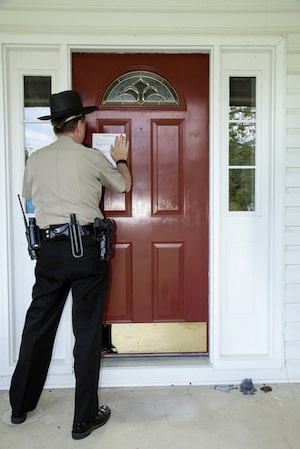Understanding Search Warrants in Illinois Criminal Cases
 In order for a person to be convicted of a criminal offense, the prosecution typically must provide evidence that a crime was committed. A search warrant is a legal document that allows police officers to enter certain places to attempt to retrieve evidence. Recent news reports about police searching the wrong home have surfaced, shedding light on the use of search warrants. Specifically, “no-knock” search warrants have faced harsh criticism and scrutiny across the country. Common among drug crimes, weapons violations, and theft, search warrants are relied upon to establish a defendant’s guilt in most cases. However, it may not be as cut-and-dry as you might think. Depending on the circumstance, a criminal defense attorney may be able to contest the admission of evidence seized in the search and prevent it from being used in your case.
In order for a person to be convicted of a criminal offense, the prosecution typically must provide evidence that a crime was committed. A search warrant is a legal document that allows police officers to enter certain places to attempt to retrieve evidence. Recent news reports about police searching the wrong home have surfaced, shedding light on the use of search warrants. Specifically, “no-knock” search warrants have faced harsh criticism and scrutiny across the country. Common among drug crimes, weapons violations, and theft, search warrants are relied upon to establish a defendant’s guilt in most cases. However, it may not be as cut-and-dry as you might think. Depending on the circumstance, a criminal defense attorney may be able to contest the admission of evidence seized in the search and prevent it from being used in your case.
Your Fourth Amendment Rights
The Fourth Amendment to the United States Constitution protects U.S. citizens and their property from unreasonable search and seizure. According to its doctrine, warrants must be issued with probable cause based on a sworn affirmation, and they must also describe the exact location to be searched as well as the items to be seized. Illinois law includes provisions to ensure that warrants are issued and executed in compliance with the Fourth Amendment, and if those provisions are not upheld, law enforcement may be violating your rights.
You may be able to contest the admission of evidence obtained with a search warrant based on several factors. For example, a clerical error could be made on the affidavit supporting probable cause, or it may include false information, making any evidence inadmissible. It is also important to note that a police officer may only seize the evidence designated in the warrant.
Illinois Search Warrant Laws
If the police have reason to believe that a suspect is violent or that evidence may be destroyed, they may ask the judge to include a no-knock stipulation in the warrant. This would allow the officers to gain entrance without first announcing their presence. In the state of Illinois, “no-knock” warrants are legal. Under Illinois law, officers are permitted to use whatever reasonable force in order to enter a building or house when executing a search warrant. In addition, the issuing judge can allow the law enforcement officers who have the warrant to enter the premises without first knocking and alerting anyone inside that they are the police. However, this can only occur based on certain criteria, meaning that police believe that certain actions would occur if advance notice were given, such as:
-
A weapon may be used against the officers executing the warrant or another individual
-
Important evidence may be immediately destroyed
Contact a Will County Criminal Defense Lawyer
Those facing charges for violent crimes can face harsh penalties if convicted under Illinois law. Many police departments gather evidence of suspected criminal activity by issuing search warrants. In some cases, this evidence may be dismissed if it was obtained illegally. At McNamara Phelan McSteen, LLC, we have proven experience successfully defending clients, including those charged with violent crimes. Our tenacious and skilled Joliet criminal defense attorneys can help you successfully defend against serious allegations so you avoid jail time. To set up a free consultation, call us today at 815-727-0100.
Sources:
https://www.ilga.gov/legislation/ilcs/fulltext.asp?DocName=072500050K108-4
https://www.ilga.gov/legislation/ilcs/fulltext.asp?DocName=072500050K108-8
 815-727-0100
815-727-0100













